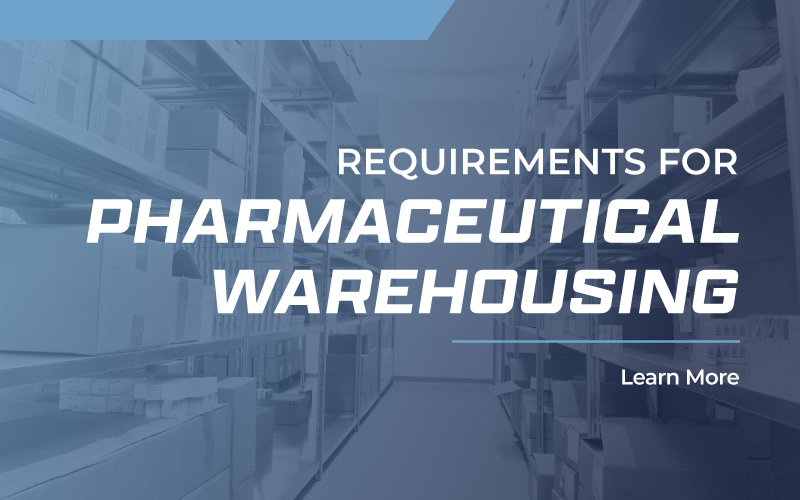If you’ve ever worked with pharmaceuticals, you’ve probably noticed two things. The first is that nearly everything about these products, even simply handling them, revolves around highly specific procedures.
The second is that storing these products, especially to accommodate the rate at which your medical facility uses them, can be complicated and downright difficult.
Luckily, we’ve got the perfect people for the job! Stat Experts is one of the nation’s leaders in efficient, secure, and reliable transportation of pharmaceutical materials. This wouldn’t be possible without their streamlined warehousing methods and procedures. Let’s take a closer look at why we should be your go-to experts in pharmaceutical warehouse requirements.
What Do Pharmaceutical Warehouse Requirements Entail?
Pharmaceutical warehousing is a complex practice that requires intricate planning and attention to detail to ensure the continued safety and effectiveness of the products.
In the United States, proper warehousing of pharmaceuticals requires close adherence to the Current Good Manufacturing Practice (CGMP) standards established by the Food and Drug Administration (FDA). These standards cover the full range of pharmaceuticals, from over-the-counter drugs to biological products and focus on maintaining correct storage conditions for each product to prevent expiration or contamination.
To add further complication, pharmaceutical warehouse requirements must also consider the unique storage requirements of each product, such as the need for temperature-controlled storage or increased security for controlled substances or hazardous products.
Ensuring compliance with these requirements is critical to maintaining the safety and efficacy of the stored and distributed products.
Specialized Environmental Control
Pharmaceutical warehouse requirements often involve a high degree of specialized control of the storage environment. Many pharmaceutical products, like vaccines, insulin, or biologics, require careful attention to their temperature throughout transit and for the extent of storage. The different temperature requirements can vary greatly, even among pharmaceuticals of the same kind. For example, the majority of vaccines must be stored at refrigerated temperatures. Some of them, however, may need to be kept frozen until preparation for use.
Likewise, there are a wide variety of biologics, which are complex products based on living tissue. These may necessitate a wide variety of controlled temperature ranges. Many of these same products will also require careful attention to humidity levels to maintain the product’s full shelf life.
Suitably Sized Facilities for Storage
The Current Good Manufacturing Practices (CGMPs) established by the FDA dictate that pharmaceutical warehouse requirements make ample storage space a priority. This is for several practical reasons.
CGMPs involve many practices related to organization, cleanliness, and storage. Not only is it crucial for the various pharmaceutical products to have enough space to meet their specific storage requirements, but there must also be enough space to safely access, clean, and organize these locations as needed. Each pharmaceutical warehouse, therefore, must be built and organized in such a way that these conditions can be maintained.
Extensive Security Measures
One of the most considerable complexities of pharmaceutical warehouse requirements is the extensive security measures involved. In the world of pharmaceuticals, certain substances must be handled with extra care for various reasons.
For some products, this is due to their classification as controlled substances. Many of these substances, such as opioids, are generally very useful in a medical sense but carry an increased risk of misuse by those without the proper qualifications or prescriptions.
Other kinds of pharmaceuticals, like certain medications for cancer treatment, are considered hazardous materials. If mishandled, these products may pose a real threat to the safety of those individuals involved.
For all of these reasons and more, most pharmaceutical warehouses require extensive security measures. This may include everything from 24/7 surveillance and active alarm systems to access control and on-site security guards.
Modern warehouse technology has made organizing, securing, and monitoring facilities like this more accessible and reliable. Still, the process requires no less attention to detail than it once did.
Above all other pharmaceutical warehouse requirements, the FDA demands intricate and accurate inventory management and reporting. This means that everything that comes and goes from the facilities must be accounted for and documented in as much detail as possible.
Get Help With Pharmaceutical Warehouse Requirements
By now, you’re certainly beginning to see the complexity of the operation that is pharmaceutical warehousing and why such an undertaking requires the right team of trained professionals.
At Stat Experts, we take our operations seriously and lend the utmost care to ensure our services are reliable, accurate, and efficient.
This is just a glimpse of the complexities that come with operating a modern day warehouse. Additional requirements may apply depending on the location of the facility, as some state laws may vary in their appointed jurisdiction.
Wherever your pharmaceutical needs may be across the United States, you can trust Stat Experts to handle the job.
Want to know more about how Stat Experts manages pharmaceutical warehousing? Contact us today!


